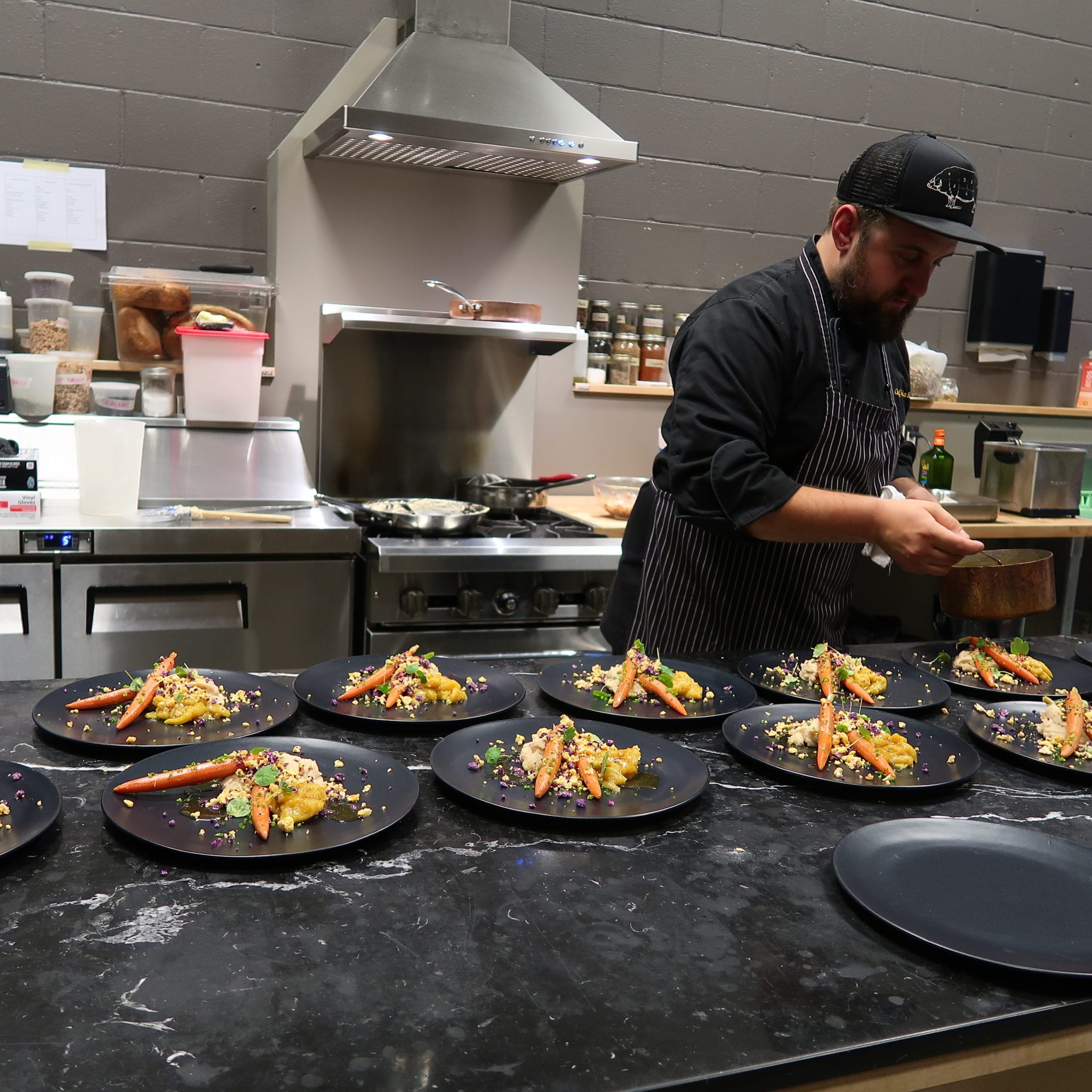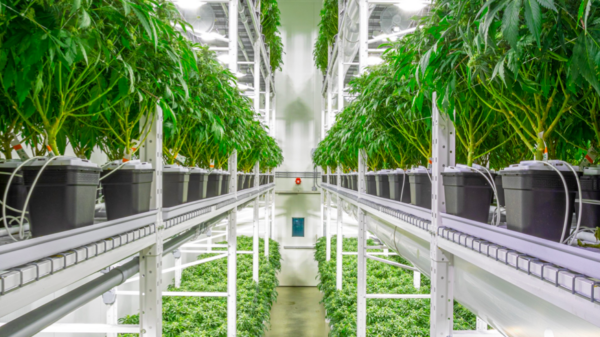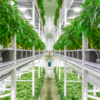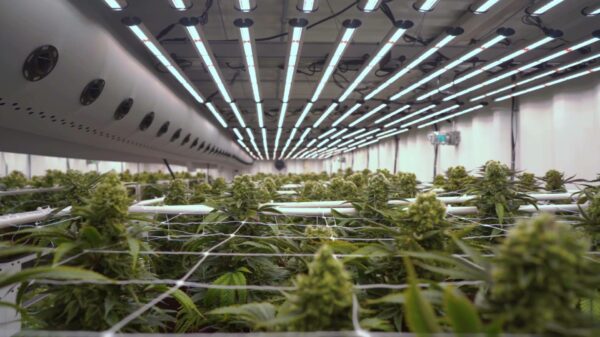Roasted ginger, turmeric and carrot soup topped with coconut and weed creme started off a seven-course infused tasting menu carefully put together by Travis Petersen, who’s been dubbed Canada’s leading cannabis chef by his peers.
Under the name the Nomad Cook, Petersen says his dosed-dinner events have been selling out at pop-up restaurants across the country and even luring Americans north of the border.
“It’s been a whirlwind,” Petersen tells Mugglehead. “I’ve served over 3,000 Canadians their first infused dining experience in the last year.”
The West Coast native even draws chefs from around the world to come to his home base in Vancouver, B.C. and learn how to cook with cannabis with exact dosing, safety and terpene profiles in mind.
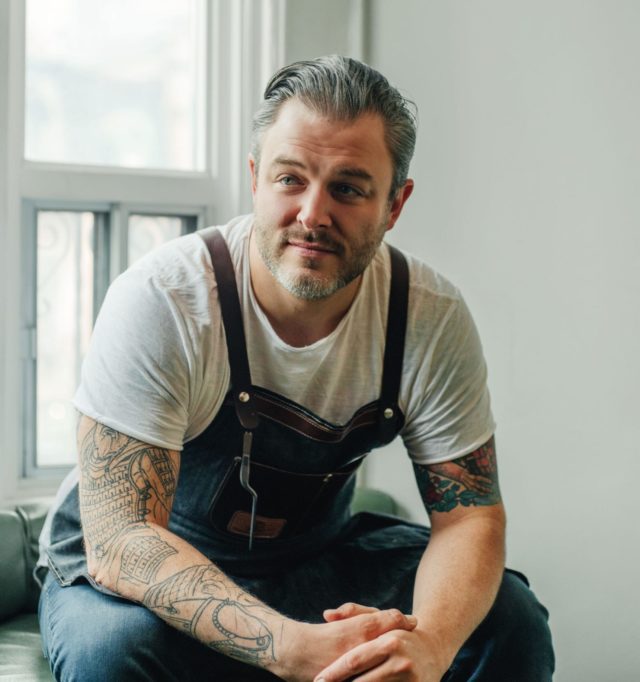
Travis Petersen has been dubbed Canada’s leading cannabis chef by his colleagues. Photo courtesy of Travis Petersen
And the lessons and the dinners don’t come cheap. The private cooking lessons for groups of six come in at $1,200, and the private dinner events are set at $150 to $250 per person depending on the ingredients used.
According to Petersen, his average guests are 38-years-old, and 58 per cent are female. Among them, 26 per cent are trying cannabis for the first time.
“The statistics speak for themselves about how this isn’t a niche little food market here — this isn’t just a fad because we just legalized. It has a place in the culinary world,” Petersen said.
Despite all the recent success there’s one big problem: Petersen’s entire operation remains illegal.
Even with cannabis 2.0 products hitting store shelves last week, the Nomad Cook and weed restaurateurs are working in a grey area of both federal and provincial law.
Read more: ‘Surprise’ selection of 2.0 products expected starting Wednesday: BC Cannabis Stores rep
“The way I look at it, this is Canada’s chance to put our flag on the culinary map,” he said. “And I’m ahead of regulations but I’m not going to slow down, I’m going to keep going with it.”
Cannabis restaurants caught in mess of red tape
Under Health Canada’s Cannabis Regulations, licensed producers must adhere to strict controls when creating edible weed products for sale in the adult-use market.
The rules include making products that are shelf-stable and do not require freezing or refrigeration, and each item must be tested for its THC content, which can’t exceed 10 milligrams per serving. The edibles must then be secured in child-resistant containers with large warning labels and an excise stamp on any cannabis product containing more than 0.3 per cent THC.
In addition, federal licence holders must also vet each edible product with Health Canada over a 60-day consultation period.
Those strict controls make it virtually impossible for cannabis chefs to legally offer up infused meals in a restaurant setting, Peterson said.
“We’ve over regulated,” he added. “We’ve tied the Cannabis Act to the Tobacco Act so there’s a lot of red tape and problems.”
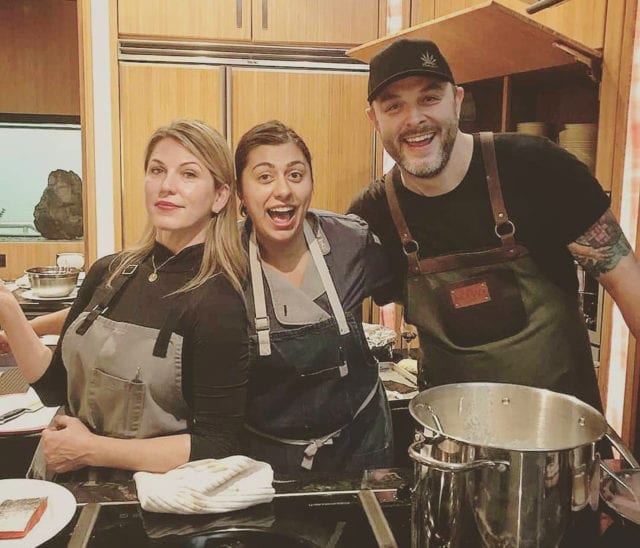
Canadian cannabis chef, Travis Petersen (right), teaches chefs Casey Thompson (left) and Silvia Barban (middle). Image courtesy of Travis Petersen
The red tape has caused the grey market to thrive and the legal market to suffer, argues Petersen. But the Nomad Cook says he’s not shy about doing business in the open and wants to show the federal government that he’s focused on education and safety.
“Health Canada knows who I am and knows what I am doing. At times I almost feel they are watching and we are almost proving the model we use works,” Petersen says.
Petersen predicts the U.S. will likely legalize recreational cannabis in the next five years, which leaves a small window open for Canada right now to seize tourism dollars and other financial rewards related to cannabis, he adds.
Petersen said he has banded together cannabis chefs from across Canada and is leading the charge to pressure both levels of government to loosen regulations and open up the industry.
But while changes could be made to open up the cannabis dining sector, government officials have indicated they’re not going to be made soon.
Health Canada spokesperson Tammy Jarbeau said that while the federal agency is in charge of the rules on producing edible products, it’s up to provinces and territories to regulate the sale and consumption of those products in their jurisdictions.
“If permitted by provincial or territorial law, packaged and labelled cannabis products manufactured by a federal licence holder, including edible cannabis, could potentially be purchased and consumed by adults in a space authorized by a province or territory for consumption,” she said.
Read more: America’s First Cannabis Cafe Opens in Hollywood
A spokesperson for the B.C. attorney general’s office said that, under the Cannabis Control and Licensing Act, cannabis in all forms can only be sold at licensed private or government retail stores for offsite consumption.
“A restaurant cannot provide cannabis infused dining options because there is no licence type available under the act and due to the restriction on promoting a place as a location to consume cannabis,” Tyler Hooper wrote in an email.
“Currently, the province is continuing to focus on establishing a well-regulated retail system and is not licensing dedicated cannabis consumption spaces or considering allowing expansion into restaurants at the moment,” he added.
‘It’s important to challenge the system’
Petersen said even with the rigid cannabis laws in place today, he expects 2020 will be a bigger year for his weed cooking business with opportunities budding in the U.S., Europe and Australia.
But on the home-front, the Nomad Cook is passionate about seeing the industry and his fellow cannabis chefs succeed. He says it’s only a matter of time before changes are made to open up the sector because of the sluggish start to legalization.
“The regulations are going to have to shift,” he says. “These corporations are losing millions and millions of dollars. The amount of pressure that is going to be put on MPs to relax regulations is going to be very heavy.”
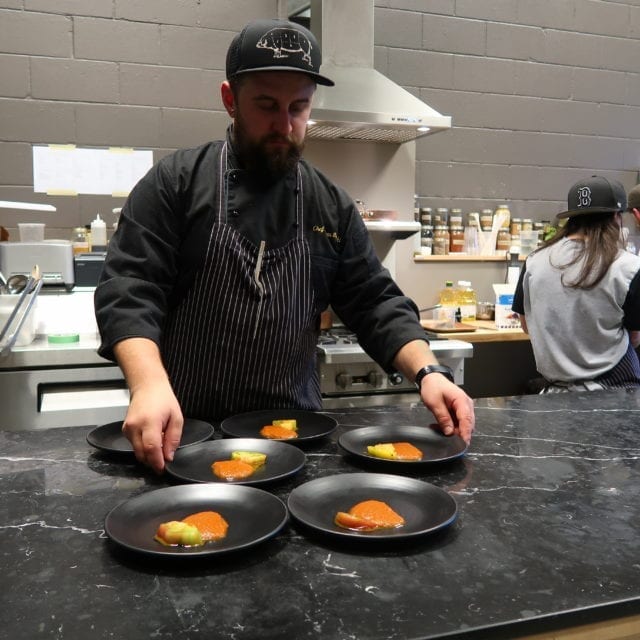
Red Seal chef turned cannabis chef Adam Barski prepares infused B.C. salmon dishes. Photo courtesy of Adam Barski
Petersen’s friend and colleague, Adam Barski, a Red Seal chef who’s been cooking with cannabis for a decade, says spreading education and knowledge is key to getting government to change.
“I do think it’s important to challenge the system,” Barski says. “Not to push against it but to challenge it so the regulators, lawmakers and the government see what we are doing and see what we are doing is done in a safe way.”
“This is important so that maybe they want to reach out to us and cooperate with us and work together to create regulations and get this going.”
For Barski, who helps run educational workshops with the High-End Dinner Series, cooking with cannabis is personal.
Two years ago, tragedy struck when an unknown pathogen left his best friend with a hole in his lung that would take five years to heal.
When his friend got out of the hospital, Barski said, he didn’t want to take the handfuls of prescription medication the doctors gave him and asked for help to heal with cannabis without smoking it.
“After he approached me, I wanted to learn how to cook with weed on a different level medicinally,” Barski said. “Doing it cleaner and finding better methods and learning about dosage and stuff like that to do it in a better way.”
This compelled Barski, who also owns and operates the Budder Bakery, to hone his skills and zero in on the science of cooking with cannabis.
He says exercising caution by offering low doses and using science is part of the strategy to convince regulators to turn over a new leaf.
“We’re just going to keep pushing the bar and hopefully the government takes notice,” Barski said. “Instead of coming after us in a bad way, we can work together with them.”
jared@mugglehead.com
@jaredgnam

